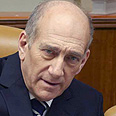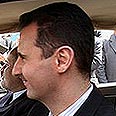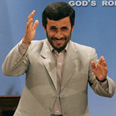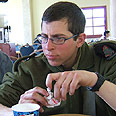





Decisions made during war were right, Olmert says
In interviews with radio stations ahead of Independence Day, prime minister notes that all his ministers, including Livni, backed decision to launch war against Hizbullah. He also promises to rectify shortcomings, says he would be pleased to see his testimony before Winograd Commission released
Shortly before the Winograd Commission's report on the failures of the Second Lebanon War is about to be published, when there are those in political arena who are already eulogizing his government, the prime minister signals that he has yet to say his final word.
"There is no doubt that failures and faults which need fixing have been revealed," OImert clarified. "We are lucky that they were revealed under the circumstances they were revealed and during those incidents.
"I have no doubt that if it were not for the fighting in summer 2006, when we would have discovered those failures and faults we would have been forced to pay an extremely heavy price for them."
"The wise thing to do," he said, "Is to draw conclusions from failures and to study then courageously and honestly. Not to deal all day with self-lashing, mutual spite, personal rivalry and politicization of the defense systems."
Olmert stressed the fact that his government voiced one stance and unanimously approved the decision to launch the war. Addressing his popular rival, Foreign Minister Tzipi Livni, he said that "the entire war her stance was determined and was definitely identical to that of the other ministers."
"The main goal we wanted to achieve in the Second Lebanon War was achieved, and that was changing the equation. It was indeed for a heavy price and under difficult circumstances, but we will draw the lessons, fix the mistakes and prepare in a better way. But the equation has indeed changed."
As for the kidnapped soldiers, the prime minister said that "from the first moment during the war, it was clear to us that the ability to bring them back would be very complex and complicated.
"From the beginning it was clear that this must be one of our goals, but even when we said it, it was clear that it didn’t mean that we had a definite chance of achieving it through a military move."
Addressing the Winograd Commission and the protocol saga, Olmert said that "the decision to prevent the publication of the testimonies was made by the committee itself. One can assume that I would be pleased to see my remarks published.
"I of course presented my point of view, the broad, complex and complicated picture. Therefore, on the level of my personal interest, I would definitely not object to the publication, although there were heavy considerations, which justified the request not to release the testimonies. But the initiative and the procedures were by the committee itself."
No apocalyptic predictions
Referring to the Iranian issue, Olmert conveyed cautious optimism.
"I believe there is a possibility, even without a military operation, to cause Iran not to be nuclear. From time to time I hear statements made by the Iranian leaders, and I am telling you that Iran is far from crossing the technological threshold.
"Unfortunately, it is not as far as I would want it to be, but it is not as close as it says it is. And I believe that the continuation of the international efforts, which Israel is part of, will achieve the goal, and there is no need to get caught up in apocalyptic predictions which have no basis in reality," he said.
And what about the signals of peace and voices of war in Damascus?
"We want to make peace with every Arab country, including Syria of course," the prime minister said. "But peace is not always made with declarations. And the fact is that for 12 years the State of Israel held three negotiations with Syria in one way or another – sometimes even through direct talks – in order to try and reach a peace agreement. They all failed, and as a result there was no change.
"Therefore, it is not enough to say out loud 'I want to make peace,' but one must also act sensibly, cautiously and appropriately, as we are. If the conditions mature and we can reach negotiations with the Syrians, there is no real opportunity we will miss out on."
"There is no leader in Europe or the United States who views Syria as a supporter of peace, and a number of vague words said by Bashar Assad do not imply that Syria is aspiring to reach a peace agreement with us," Olmert clarified.
He implied, however, that the signals coming from Damascus were being examined in secret and indirect ways, which he refused to elaborate on.
Pakistani President Pervez Musharraf's offer to mediate between Israel and the Palestinians was rejected by the prime minister, for now. As for the prisoner exchange deal, he reiterated that the list of prisoners Hamas wanted to see released "included names which I don’t think we will be able to release."
To conclude, Olmert asked to address the "beautiful things" in Israel.
"I think about the State of Israel of 2007 and I see before me an incredibly strong state with economic achievements. I see less families living in poverty. I see more and more people who are being given a chance by the state to be socially rehabilitated. We are exerting great efforts to improve the social situation, the distress of parts of the population.
"Israel has a reason to be proud. Israeli citizens have a reason to stand high and look forward in hope. I am motivated by the great belief that our state is wonderful, that its residents love it and are willing to fight for its safety. I want to tell all the people of Israel: Let's embrace each other again with a lot of love and respect."















